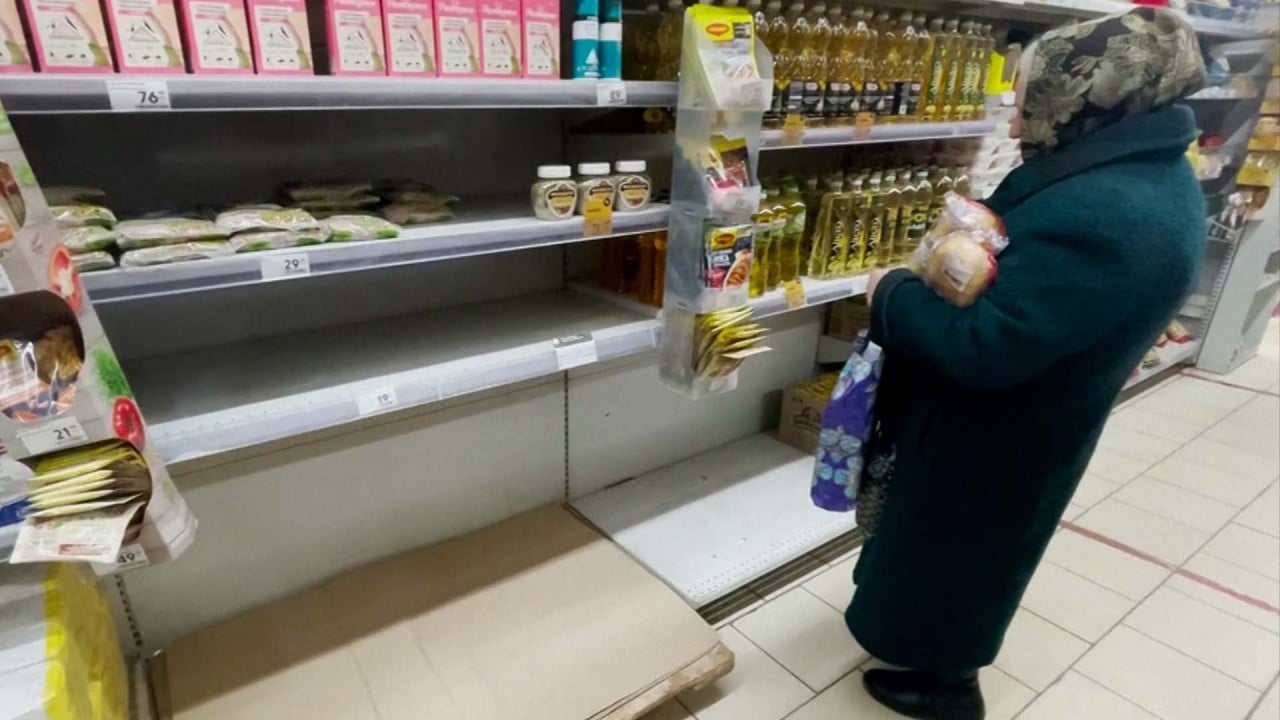
Ukraine war: Nato meeting jump-starts unprecedented trio of summits in Europe
- Brussels is hosting an extraordinary gathering of leaders in a one-trio of summits; sends a signal to Russia while ensuring Nato allies remain on the same page
- Ukraine’s president urged alliance to step up military help to help his country fight an enemy whose massive arsenal is being deployed ‘without limitation’
President Joe Biden arrived at Nato headquarters in Brussels on Thursday for a day of summits, seeking to keep the 30-nation alliance united in its effort to isolate and punish Russia for its invasion of Ukraine.
The extraordinary gathering of leaders, planned in just days, was convened largely to send a signal of resolve to Russian President Vladimir Putin while ensuring Nato allies remain on the same page as they plot additional measures against Moscow and prepare for scenarios that could draw them deeper into the conflict.
“We are determined to continue to impose consequences on Russia to bring about an end to this brutal war,” Nato Secretary-General Jens Stoltenberg said as he opened the meeting, expressing support for Ukraine, recognising “the great courage” of its people and of those inside Russia “who are bravely speaking out against the war.”
“We hear the voices,” he said. “They matter.”

Stoltenberg announced Wednesday that Nato was likely to formalise a decision to double the number of battle groups on its eastern flank, which would mean deploying more forces to Bulgaria, Hungary, Romania and Slovakia. The alliance has already doubled its initial troop presence along the eastern flank since Russia launched its invasion of Ukraine on February 24.
There are 100,000 US troops stationed in Europe. Jake Sullivan, Biden’s national security adviser, said Wednesday the administration does not currently have plans to send more forces to Europe.
Nato leaders began a closed session Thursday after posing for a “family photo,” and they are expected to announce additional sanctions on Russia. The US also plans to impose new sanctions on more than 300 members of Russia’s Duma, the White House has said.
Chinese embassy in Washington ‘believes US, China can cooperate on Ukraine’
Volodymyr Zelensky, Ukraine’s president, addressed the summit via video, asking the alliance to step up military help to help his country fight an enemy whose massive arsenal is being deployed “without limitation.” Zelensky has made similar requests in speeches to lawmakers in Washington, Berlin, Ottawa and other Western capitals in recent days.
Biden arrived in Brussels on Wednesday evening and will also participate in meetings Thursday afternoon with the Group of Seven leaders and the European Commission. He will hold a news conference before travelling to Poland on Friday.
The discussions among leaders, Sullivan said, would include planning for numerous “potential contingencies,” including what to do in the event that Russia launches cyberattacks against the US or other Nato countries or uses chemical or biological weapons in Ukraine.
Under Nato’s Article V, an attack against one member nation is considered an attack against all. Since Russia began its war in Ukraine, Nato members have imposed severe economic sanctions, taken steps to ban or limit imports of Russian energy and contributed billions in defence aid to Ukraine. They are attempting to punish Moscow as severely as possible while steering clear of any direct military engagement that Putin could use to justify expanding the conflict into Nato territory.
Putin, allies fear, may seek to escalate the conflict out of frustration in his brazen campaign’s lack of progress. Russian officials seemed to have believed the invasion would take just days but instead has bogged down as the war enters its second month. Perhaps as many as 10,000 Russian troops have been killed by Ukraine’s military and resistance fighters, which Wednesday halted the eastern advance on Kyiv and pushed back Russian troops several miles.
Up to 15,000 Russian troops dead in Ukraine, Nato says
With Russia struggling to conquer Ukrainian territory, Putin has increasingly unleashed artillery, bombs and missiles against civilian targets, prompting Secretary of State Antony Blinken on Wednesday to formally declare that the US has concluded Russia’s actions against Ukraine constitute war crimes.
The crisis in Ukraine has taken Biden’s own chosen frame for his presidency – a historic confrontation pitting democracies versus autocracies – beyond the theoretical. It has also served as the impetus for reinvigorating a transatlantic alliance that, some seven decades after World War II, had seemed to be losing its focus and shared purpose.
But Stephen Sestanovich, an expert on Russia at the Council on Foreign Relations, said Biden will have to ensure Nato members enact more sanctions and take other concrete steps to punish Russia if he wants the meeting to be considered an operational success.
It remains unclear how much further some European countries are willing to go. While Germany, for example, has committed to increasing defence spending and halted the certification of the Nord Stream 2 gas pipeline from Russia to its Baltic coast, it continues to rely on Russian energy, as do many other European countries.
“This war is accelerating Europe’s awakening to the real threat posed by Russia,” said Alexandra de Hoop Scheffer, transatlantic security research director for the German Marshall Fund.
US declares Russia has committed war crimes in Ukraine
“But it seems that the European Union has pretty much reached the limit of what it actually can do because if we really wanted to act seriously and cause pain to Russia, it would involve limiting our imports of gas and oil,” Scheffer said, adding that some countries have declared they cannot take such action.
Calling the coming days “a tipping-point phase of conflict” because Russia may be encountering difficulties on the ground while Ukraine is fighting hard but desperate for more aid, Scheffer said Nato countries needed to “accelerate our support before it’s too late. It’s not a question of months or weeks, it’s a question of days.”


